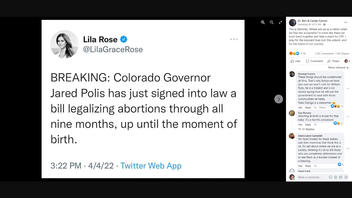
Did Colorado Gov. Jared Polis sign a bill that legalizes abortion up until the time of birth? Not exactly: Although Polis did sign HB22-1279, also known as the Reproductive Health Equity Act, or RHEA, that bill only codified the state's already existing reproductive rights into Colorado law and prevents state and local interference in reproductive measures such as abortion. Even before the bill was signed, Colorado did not have a gestational limit, which is a period during pregnancy in which terminating the pregnancy is legally allowed.
The claim appeared in a Facebook post (archived here) on April 5, 2022. It includes a screenshot of a tweet that reads:
BREAKING: Colorado Governor Jared Polis has just signed into law a bill legalizing abortions through all nine months, up until the moment of birth.
This is what the post looked like on Facebook at the time of writing:
(Source: Facebook screenshot taken on Thu Apr 7 14:49 2022 UTC)
Although the post's "BREAKING ..." caption implies the bill is a new development or change in Colorado's abortion regulations, sponsors and the governor say it does not change anything regarding abortion availability or restrictions in the state. Colorado is one of the few states that does not have a gestational limit on abortions.
According to the signing statement from Polis, the Reproductive Health Equity Act "simply codifies existing protections in statute." His statement went on:
The bill does not make any changes to the current legal framework for parental notification that exists in state law. This bill will also prevent any person from being forced to end or continue a pregnancy, and ensure that no one is forced to perform or have an abortion against their will or conscience. Such is already the case in Colorado today. This bill simply maintains this status quo regardless of what happens at the federal level and preserves all existing constitutional rights and obligations.
The passage of the bill means that there will be a Part 4 added to Colorado Revised Statutes, Title 25, Article 6, which concerns family planning.
Lead Stories was forwarded a statement from Colorado House Majority Leader Daneya Esgar, one of the sponsors of the bill, on April 6, 2022. In her statement, Esgar reiterated the absence of a gestational limit in the state and explained how abortion-related reproductive health care operates in the state:
Colorado's reproductive health care laws consider the complex, patient-by-patient circumstances that lead people to seek an abortion during pregnancy. Alongside the guidance of a provider, many factors are taken into consideration before a later abortion is offered to the patient. This includes the health of the pregnant person and viability of the fetus, just to name a few. Without a maternal or fetal indication for abortion, a viable full-term pregnancy would not meet the provided recommendations for a later-term abortion. RHEA does not change the existing level of access that women in Colorado already have to the full spectrum of reproductive health care options, including abortion.
Lead Stories previously published fact checks about introduced state reproductive health bills in California and Maryland.















